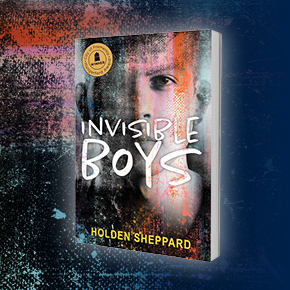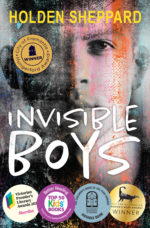Read this and be smarter: Hungerford Award winning author Holden Sheppard writes about the difficulties of growing up gay in country-town Australia in his honest and heartbreaking novel Invisible Boys

Holden Sheppard won multiple awards for his manuscript Invisible Boys even before it was published, including the City of Fremantle Hungerford Award in 2018.
And it could be your turn to write the next Hungerford-winning book that will nab a $15,000 cash prize and a publishing contract with Fremantle Press. Just visit the Fremantle Press website for the terms and conditions, and make sure you’re ready for the competition opening on Monday 3 February.
Even better, come along and see Holden on a panel at the Business of Being a Writer event on Saturday 22 February at Perth Festival Literature and Ideas Weekend. More details are available on the Perth Festival website.
For now, here’s a taster of Holden’s incredible story of four boys surviving growing up gay in regional Australia against all odds.
Charlie
There are two ways out of this poxy shithole of a town: you leave in a blaze of glory and never look back, or you die.
I don’t want to die.
I’ve wanted the blaze of glory option since I was a little kid.
*
When I was ten I used to wake up on Saturday mornings and run to the lounge room to watch cartoons. We’d had a flat screen once, but Dad sold it at Cash Converters for rent money. We ended up with this piece of crap boxy TV with a wonky aerial held together with Blu Tack and lacky bands.
One morning, I got to the lounge and Dad was already sitting on the sofa watching something loud. He was hunched forward, nursing a king brown of Emu Export, eyes hanging out of his head as he squinted against the slats of sunlight creeping through the venetians. I’d never seen him drunk before, and I suppose that was the start of everything going wrong, but at the time I just remember seeing him as a man instead of as my dad. I thought he looked damn cool.
‘Charlie, look at that,’ he said. ‘That’s what it means to stick your middle finger up at the world.’
He was watching Rage. It was a music video of some 90s punk band – I think it was Rancid. I remember being taken by their mohawks, coloured hair, tattoos, piercings and clothes. The way they dressed was rad. They looked like a feral army that marched to its own raging drum.
‘Don’t they get in trouble at work?’ I said.
Dad chuckled, and took a swig of beer like he had to wash something bitter down his throat. ‘They don’t have to work, kid,’ he said. ‘They don’t have to do anything they don’t want to. They make punk music. They do what they want, when they want. That’s the dream, buddy.’
That was the Saturday morning I stopped watching cartoons. For the next year or so, I’d get up and watch old music videos on Rage with Dad as he either sobered up or drank straight through his impending hangover, depending on how his week had gone. And when he got his compo payout for his leg getting crushed by that machine, we upgraded to cable and we could watch music videos whenever we wanted, from just about every era and genre. That was the best year. Dad told me all this stuff I never knew he knew, about all the punk bands, and about grunge, and metal, and even 70s glam rock like Sweet and T-Rex. And he told me all this stuff you’d never get told at school, like how the government tries to keep everyone poor so the one percent of rich people keep all the money. And all the conspiracy theories. Dad didn’t trust anything that happened in the news; he always had a counter point that made me think.
One morning, after I watch the film clip for Green Day’s “American Idiot”, with Billie Joe Armstrong leaping into the air with his guitar and swaggering around like the god of punk, I said to Dad, ‘I wanna do that. I wanna be like him.’
‘Don’t just want to be him,’ Dad said at once, swirling his Woodstock and Coke. ‘Be him. Do it, buddy. Only you can make it happen.’
After that day, he started giving me jobs to do around the house in exchange for a two-dollar coin here and there. For a few months, I pulled weeds, brushed away spider webs, helped fix the barbeque, took the rubbish out, and fed the dog (until we had to put her down). I even emptied Mum’s ashtray so she wouldn’t have to miss a second of Neighbours (or get off her fat arse, which was the real issue). And Dad was always good for the payments: for each chore, I got a gold coin, which I clinked into an old Peters ice cream container.
When I was eleven, Dad took me to the only shop in Geraldton that sold guitars and I bought my first cheap-arse Gibson.
I knew then, the first day I started tightening the strings and playing out-of-tune Smoke on the Water, that this was my way out. My ticket to something bigger: to becoming the next Billie Joe Armstrong or Dexter Holland or maybe Dave Grohl. This would be my blaze of glory.
Invisible Boys by Holden Sheppard is available on the Fremantle Press website and at all good bookstores.



